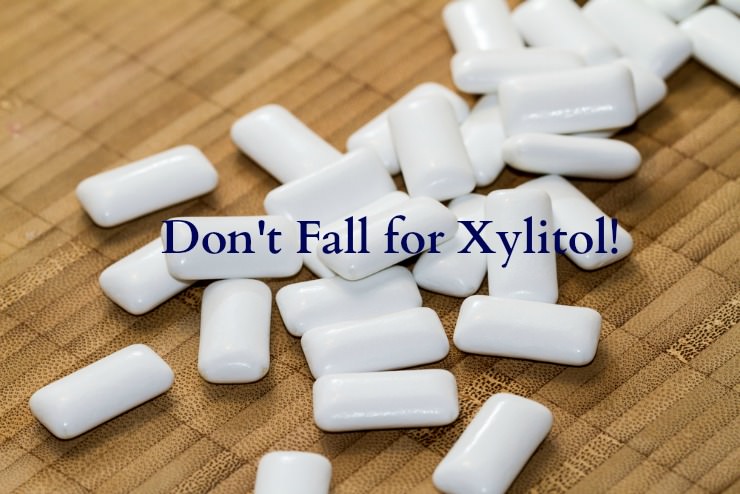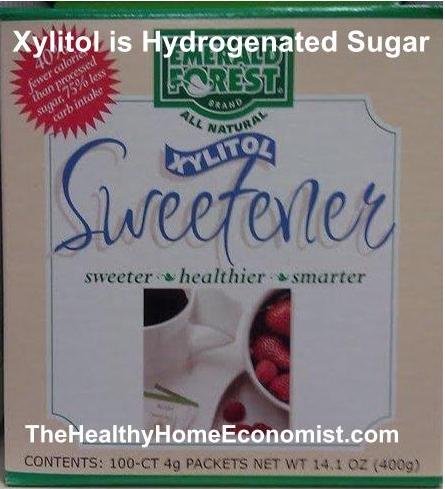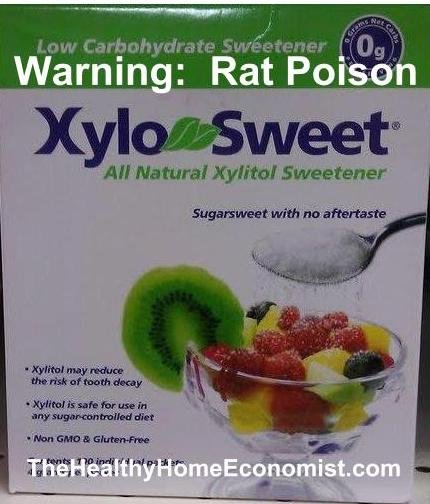
Xylitol is truly the darling of sugar substitutes today. The American Dietetic Association touts its use, with this sugar alcohol sold alone and as a sweetener in a variety of processed foods. Health benefits include a reduced glycemic response compared with sucrose, increased absorption of B vitamins and calcium, and even a reduction in dental caries risk.
Consequently, people with blood sugar issues are flocking to processed foods containing this alternative sweetener as a way to satisfy that sweet tooth without the downside of exacerbating the risk factors for Metabolic Syndrome. This condition is known for the markedly increased likelihood of developing heart disease, stroke, and type 2 diabetes.
Even the healthfood community almost universally considers this sugar alcohol to be a healthy substitute for sugar. A primary reason is that it doesn’t directly contribute toward the growth of intestinal yeasts aka Candida.
Have you noticed that the check out aisles at health food stores are typically loaded with chocolates and other sweets containing at least some xylitol? The truth is that I have yet to talk with any health-conscious person who suggests to me any downside other than the potential for intestinal cramps if you get too much.
Xylitol is Naturally Found in Nature
Xylitol is, after all, a naturally occurring substance. Manufacturers of xylitol market it as derived from xylan. The fibers of many plants contain it, including berries, oats, beets, sugar cane and birch. Sounds pretty harmless at first glance.
The FDA has even granted xylitol GRAS (Generally Recognized As Safe) status. You can’t get any safer than that, right?
 Manufacturing Process
Manufacturing Process
It is true that xylitol is a naturally occurring substance. However, manufactured xylitol is another matter entirely. Food manufacturers produce it using the industrialized process of sugar hydrogenation. In order to hydrogenate anything, a catalyst is needed. In this case, Raney nickel is used which is a powdered nickel-aluminum alloy. (1, 2)
This poses the risk of heavy metal residue and contamination. Nickel, by the way, is a recognized carcinogen and aluminum is associated with the development of dementia. Heavy metals in the body are notoriously difficult to eliminate with frequent use of infrared sauna probably a good idea.
This alternative sweetener doesn’t seem quite so warm and fuzzy anymore, does it?
There is currently no literature on any detrimental health effects of consuming hydrogenated sugar. However, food manufacturers widely used hydrogenated fats for decades before the very damaging effects of cardiovascular health became widely known!
Given the violent industrialized process that is required to produce a hydrogenated sugar like xylitol, it would seem wise to avoid it based on the very poor track record of hydrogenated foods in general.
Most Xylitol Sourced from GMO Corn
While it is true that xylitol can be derived from the xylan of birch trees, xylan is also found in corn cobs. It is much cheaper to use corn instead of birch bark to derive xylitol and so what do you think manufacturers prefer? Corn, of course.
Therefore, unless the label of a xylitol-containing product specifically notes that it is from birch or another nonGMO source, xylitol is very likely from genetically modified corn or possibly GMO sugar beets.
This is the same problem as high fructose corn syrup (HFCS) and white sugar from beets. Food manufacturers rely heavily on these sweeteners in the production of sodas and sports drinks.
You get a dose of GMOs with every sip! More on GMO dangers including sterility and stomach holes at the provided link.
Usage Contributes to Gut Imbalance
The digestive process does not break down sugar alcohols like food. Rather, xylitol arrives intact into the intestines.
At that point, a process called “passive diffusion” takes place. This means that the xylitol draws water into the bowels. Only a partial breakdown is the end result. The unmetabolized portion ferments providing the perfect environment for undesirable bacteria to thrive and grow.
It is true that xylitol itself does not feed candida directly as sugar does. As a result, this artificial sweetener is even promoted as a useful part of the Candida Diet. Unfortunately, the fermentation of undigested xylitol in the gut most definitely can exacerbate yeast problems. Don’t be fooled by this argument!
This is exactly why consuming xylitol can make some folks so gassy and even trigger cramping and diarrhea. Gut pathogens having a heyday in your intestines give off a lot of smelly toxins!
Other Little Known Problems
Xylitol can contribute to acid reflux problems. As a result, those who have issues in this area should avoid it for that reason alone. Chronic acid reflux is a serious problem that can lead to cancer of the esophagus and larynx.
In addition, those who suffer from seizures of any kind should stay away from this alternative sweetener as it can increase the frequency of epileptic attacks.
Two Pieces of Xylitol Gum Can Kill a Rat?
According to unpublished lab tests, approximately 1.65 grams of xylitol kills a 100-gram rat half the time.
Two little pieces of xylitol gum contain about .7 – 1 gram. This is probably enough to meet the definition of rat poison.

Cavity Prevention
Many people are chewing xylitol gum due to compelling scientific evidence for cavity prevention. What about children, however?
Rami Nagel, author of Cure Tooth Decay, doesn’t even recommend xylitol gum for this purpose. His research for any long term safety data turned up the following:
- Epidemiology: No information found
- Teratogenicity: No information found
- Reproductive Effects: No information found
- Mutagenicity: No information found
- Neurotoxicity: No information found
In summary, using this modern substance officially renders you a guinea pig, my friend! It seems that any benefits of cavity prevention are outweighed by the fact that there is no actual safety data backing up its use.
Safe Uses of Xylitol
Given all the problems that consumption of xylitol can trigger, it seems best to bypass the use of this sugar substitute on a regular basis.
Can it ever be helpful? Does it have any benefits whatsoever?
Potentially so. The only time I personally would ever consider using xylitol is to help resolve a childhood ear or sinus infection in order to prevent the use of drug-based antibiotics.
There is evidence that this popular sugar alcohol can indeed help encourage a healthy balance of beneficial bacteria found in the ear canal and sinus cavities. Products like this incorporate xylitol for this purpose.
A therapeutic dose can help resolve infection in these areas quickly with no medication required.
Thus, if you choose to use it, make sure it is sparingly and therapeutically (not as food). Also, make sure it does not come from a GMO source like corn!
References
(1) Xylitol production via catalytic hydrogenation of sugarcane
(2) Catalytic hydrogenation of xylose to xylitol using ruthenium catalyst on NiO modified TiO2 support
(3) Cure Tooth Decay by Rami Nagel
(4) Sugar-Free Blues: Everything You Wanted to Know about Artificial Sweeteners
More Information
Yacon: Healthy Syrup or Healthfood Hype?
Jaggery: India’s Sweet Gift








This is great article. My husband’s doctor recommended xylitol for his candida. Now I’m wondering what we can use instead. Any suggestions?
Interesting! We just used xylitol to clear up a sore throat in my 4 year old. It is not something I like to use on a regular basis though.
I’m not sure I understand why so many people are opposed to natural sugars like raw honey or sucanat as an occasional sweetener? Just the term “sugar substitute” screams “unnatural” to me. If it is Candida problems they must realize there is more to it than just sugar consumption.
Thank you for the info. I’ve been using small amounts of hardwood xylitol with great results (no abdominal issues, nor heartburn or reflux, etc). It’s really the only sweetener I can use–everything else tastes vile and causes problems for me. Stevia tastes like eat poison smells to me.
I appreciate the info on how it’s refined (how can they call it a “natural” sweetener when it must be so highly processed?? ).
But I was wondering, in the absence of studies, what your basis is for statements about the effects of xylitol in the gut during digestion? If, as you say “There is evidence that xylitol can indeed help encourage a healthy balance of beneficial bacteria found in the ear canal and sinus cavities and that a therapeutic dose of xylitol can help resolve an infection in these areas quickly with no medication required.” Why would this be different in the gut??
And is there dicumented evidence of heavy metal residue in xylitol?
Sorry, make that “rat poison”.
I am REALLY bumming right now bcz I ordered a HUGE bag of xylitol (and I mean huge-50 pounds) to stock up for a couple of years. I tried and tried to research and could find nothing adverse in my findings. Gosh, I am feeling very uneasy now.
Also, just in the last month, I’m finding myself outrageously emotional, nails are totally flaking in layers and a couple of joints are hurting. Makes me wish I had someone to really check me out! I need a naturapath!!
I really appreciate helpful information, but this article does have self-conflicting info in it. Sarah, you mention the issue of possibly there being metals left in the xylitol from processings, but this quote from Natural News (the article written by Ravi) states that there is NO metal left in the xylitol:
4. The resulting syrup, now free of acetic acid, hydrolyzing acid, nick-aluminum and other residues.
This is the article you are citing above.
Furthermore, everyone is in a tizzy about xylitol and dogs, but as few as 7 grapes or raisins can kill a dog: http://www.snopes.com/critters/crusader/raisins.asp
and only 2 ounces of baker’s chocolate to kill a 20 pound dog: http://animals.howstuffworks.com/pets/question348.htm
So I think we need to keep our heads on straight. I am sure few dog owners keep raisins and chocolate out of their homes.
Also, I only use USA produces birch xylitol so I appreciate the concern about China.
Learn more: http://www.naturalnews.com/022986.html#ixzz2EOAsM2a4
Thank you for your comment…you provided great info…I never knew grapes & raisins could be fatal if consumed by dogs!
I remember having to take my dog to the vet because she ate a package of gum with xylitol in it, which is apparently poisonous to dogs. I have seen so many bloggers recommend using xylitol in homemade toothpaste, and I have never had a good feeling about that. Thanks for this info!
I’ve seen several comments on toothpaste, so I’m assuming mouthwash with xylitol would be a bad idea too? Tom’s is the only natural one I can find though. Since I use their toothpaste, it’s likely that I’m getting xylitol with that too.
I make a mouthwash using water, wintergreen EO and grapefruit seed extract. Refreshing and antibacterial.
my dentist was quite pleased when I told him I’d made toothpaste with xylitol in it (although the hygienist gave me a hard time for not having any fluoride in there), and my baby’s dentist gave me xylitol wipes and told me not to nurse him to sleep, and to wipe his teeth with the wipes after his night nursing session. (I haven’t done it, because it’s a hassle, and I don’t believe breastmilk gives babies cavities.)
I get a neural responce that leads be to believe the refineing process has a chemical process with a protiene I cannot process….I get the same responce form MSG, Tapioca, Agar, Potato Starch, Corn Starch…………….its IN the Science somehwere!
Thanks for sharing this, as I too am sensitive to those things you mentioned, so would probably have the same issue with xylitol. I was going to make toothpaste with it since I’d heard so much about it helping with cavaties. Right now I’m using Tropical Traditions toothpaste and like it.